Lack of Legal Authority Stymies Great Lakes Aquaculture
Michigan decides against pursuit of fish farms in public waters of Lake Huron and Lake Michigan.
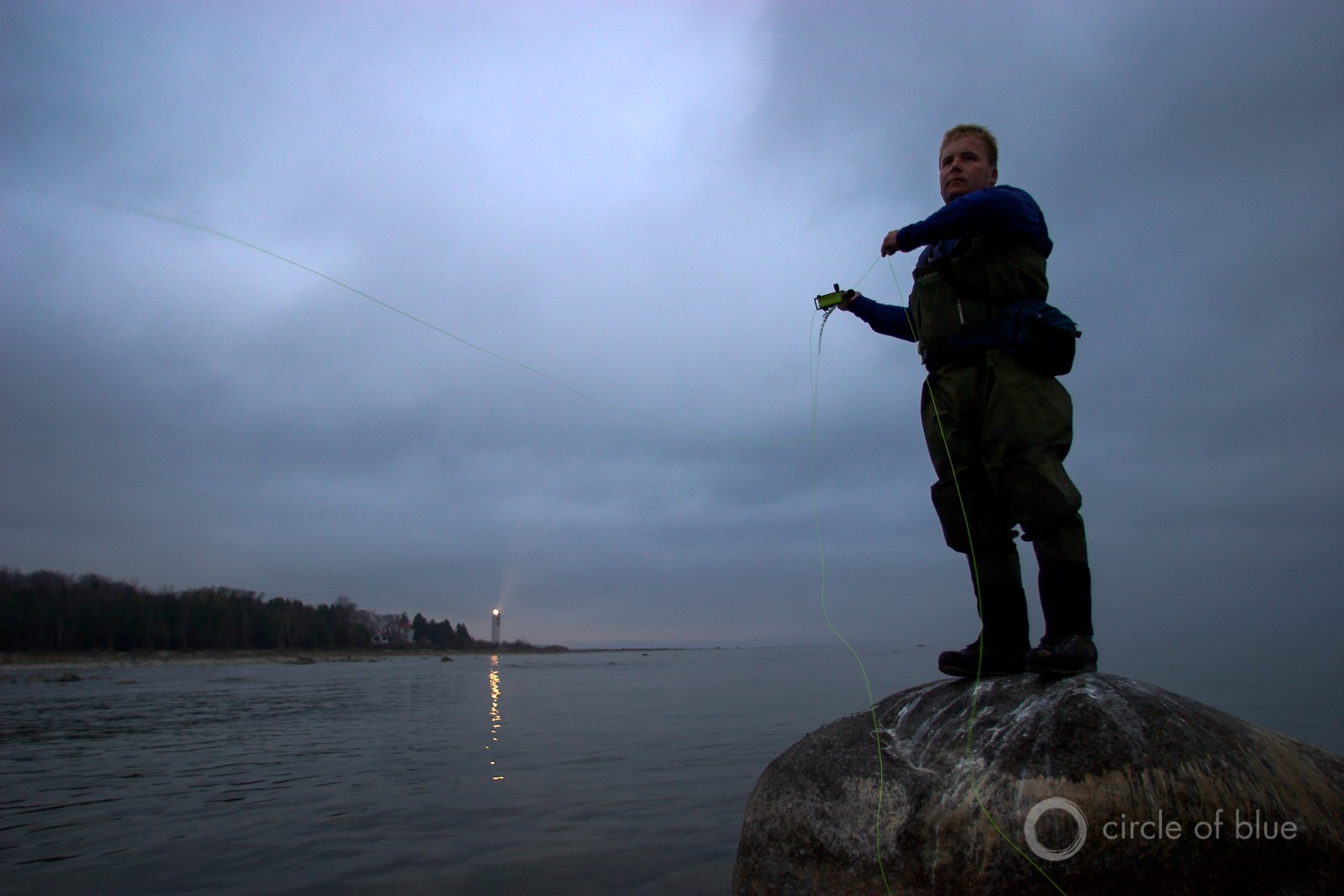
Michigan, the Great Lakes State, is a haven for recreational and charter fishing. The state has decided not to pursue commercial aquaculture in the Great Lakes at this time. Photo © J. Carl Ganter / Circle of Blue
By Codi Kozacek
Circle of Blue
In a succinct report released last month, a workgroup tasked by three Michigan agencies to evaluate whether the state should allow commercial fish farms in the open waters of the Great Lakes responded with an unequivocal no. In doing so, the workgroup dealt another setback to an infant aquaculture industry that faces a stiff headwind of public opposition.
Key among the report’s findings was the lack of legal authority to permit fish farms in the Great Lakes. The lakes form the heart of the region’s culture and economy, and their waters are a public resource held in trust by the state. That means they are protected for the beneficial use of the public. Under the Michigan Aquaculture Development Act of 1996, the law that regulates the state’s fish farming industry, aquaculture facilities may be placed only in privately controlled waters or on land.
Based on current Michigan law, commercial net-pens cannot legally operate in the Michigan portion of the Great Lakes.
That is an obstacle for aquaculture advocates, who envision the use of net-pens — underwater nets that can hold thousands of fish and would be placed directly into the Great Lakes — to grow the industry.
“Based on current Michigan law, commercial net-pens cannot legally operate in the Michigan portion of the Great Lakes,” the report concluded. Its authors cited the legal barrier, as well as uncertainties about potential environmental risks from disease and fish waste and the significant cost to create a sufficient regulatory structure for the farms, as reasons that they “do not recommend pursuing of commercial net-pen aquaculture in the Great Lakes at this time.”
It added that the state “can and will continue to work within existing authorities to assist the industry in development of well-designed flow through, closed and recirculating aquaculture facilities.”
Potential to Grow
Of the 54 licensed aquaculture facilities in Michigan, most produce fish to stock for recreational purposes, not for fillets to buy at the grocery store. Only seven are listed as providing dressed fish for consumption, according to state records. Aquaculture proponents say Michigan, situated on the shores of the largest body of fresh surface water in the world, has the potential to produce far more food fish and could, in the right political and social climate, support a $US 1 billion industry. In comparison, aquaculture sales in the state totaled just $US 3.9 million in 2012, the most recent year data are available. That ranks Michigan 38th in the country.
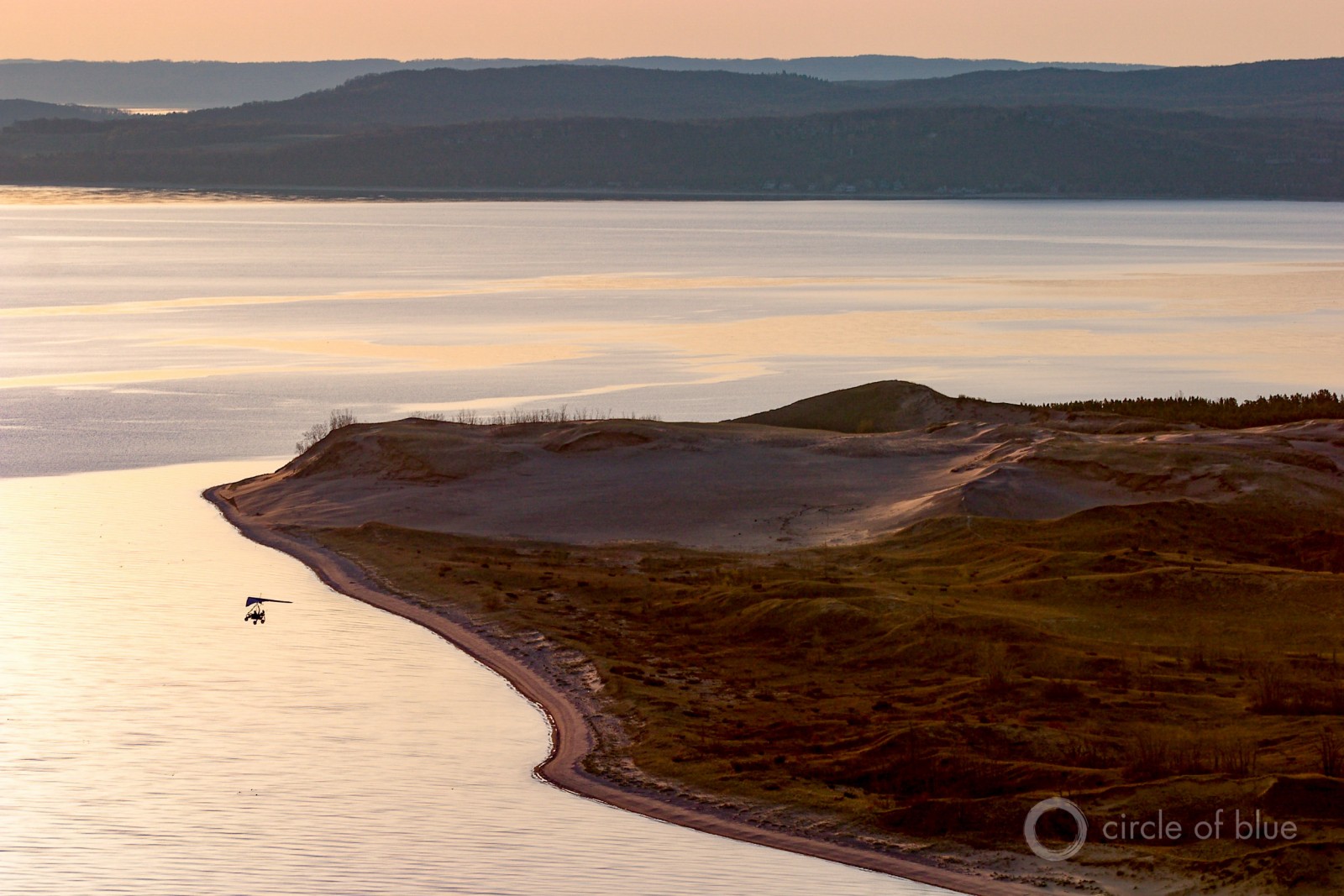
Michigan law does not currently allow fish farms to operate in public waters, including the Great Lakes. Legislation introduced in the past six months could change that. Photo © J. Carl Ganter / Circle of Blue
A crucial component of creating a more robust Michigan industry, aquaculture experts say, is the use of net-pens. While other types of facilities would also play a role, including flow-through systems that siphon river water through raceways and land-based recirculating systems that recycle most of the water they use, net-pens provide a cost-effective way to scale up production, according to Chris Weeks, a regional aquaculture extension specialist at Michigan State University.
“That is the biggest issue facing Michigan aquaculture right now—will net pens be allowed?” Weeks said.
None of these facilities exist in the U.S. waters of the Great Lakes, though nine rainbow trout farms currently operate in the Canadian waters of Lake Huron. In 2014, however, two companies, Ontario-based Cold Water Fisheries and Ann Arbor-based Aquaculture Research Corporation, approached Michigan regulatory agencies to develop commercial farms in the Michigan waters of Lake Huron and Lake Michigan. The proposals kicked off a state feasibility review, which concluded with the synthesis report last month.
Legislation For and Against Great Lakes Aquaculture
Nonetheless, Michigan lawmakers in the past eight months have introduced six pieces of legislation to change state laws to allow the development of commercial aquaculture facilities in the Great Lakes. Two bills have been introduced to definitively prohibit fish farming in the Great Lakes.
Senate bills 681, 682, and 683, submitted by Sen. Darwin Booher in December, promote policies that would expand Michigan’s aquaculture industry. Specifically, the bills would amend the Michigan Aquaculture Development Act to include water-based aquaculture facilities, defined as “floating or submersible enclosures, including peripheral docks and mooring anchorage points used for aquaculture.” They significantly add a provision for aquaculture facilities to be located within public waters, including the Great Lakes, as well as in privately controlled waters.
A crucial component of creating a more robust Michigan industry, aquaculture experts say, is the use of net-pens.
However, the bills also prohibit facilities that would impede navigational and recreational uses of Great Lakes waters, and outline restrictions that would keep fish farms outside of harbors and channels in “relatively low-use” areas. Further, they would limit aquaculture development in the Great Lakes to 10 facilities within the first five years after the bills are made law.
The Senate bills are mirrored by a set of three bills introduced in the House by Reps. Ed McBroom and Tristan Cole.
Senate bill 526, introduced in September by Sen. Rick Jones, also takes aim at the Michigan Aquaculture Development Act. It seeks to ban aquaculture development in the Great Lakes, and would prohibit any aquaculture facilities within Great Lakes waters and any water body that is hydrologically connected to the Great Lakes.
The accompanying House Bill 5255, introduced by Rep. Jon Bumstead, is slightly different. It specifically prohibits net-pen aquaculture facilities in the Great Lakes and the connecting waters of the Great Lakes, which it enumerates as the St. Mary’s River, the Detroit River, Lake St. Clair, and the St. Clair River. It also prohibits net-pen aquaculture in rivers and lakes that are connected to the Great Lakes by open water, up to the first dam.
Public Trust Preempts Changes to Law
Legislative committees are currently reviewing all of the Michigan aquaculture bills, and both supporters and detractors of the industry are closely tracking their progress. Without changes to current regulations, Great Lakes fish farms in Michigan will likely be off the table.
“It’s up to the legislators. Right now, you can’t according to the state—it’s not allowed. There’s no legal framework for which to grow fish in the Great Lakes,” Weeks told Circle of Blue. “In Michigan waters, without the legislation, I would say that, according to the state anyway, it’s not going to move forward. Now, if the legislation moves forward, then we’ll see.”

Allowing aquaculture in the Great Lakes would require it to be deemed an acceptable private use of a public trust resource. Photo © J. Carl Ganter / Circle of Blue
But even if the law is changed to accommodate aquaculture in public waters, it may just mark the beginning of legal challenges. According to a statewide poll conducted by Lansing-based research firm EPIC-MRA in January, 56 percent of respondents opposed commercial fish farming in the Great Lakes, while only 17 percent said they supported it. Because the Great Lakes are a public trust resource, their protections go beyond what legislators in Michigan may or may not approve, according to Liz Kirkwood, executive director of Traverse City-based environmental law group For Love of Water (FLOW). Passing laws to allow Great Lakes aquaculture could open the state up to lawsuits, she said.
Fish farms in the Great Lakes would, for example, discharge phosphorus to public waters because there is currently no technology to capture excess feed and fish waste from net pens, according to a science review completed by Michigan. It noted that such discharges would equal an “externalized” cost to the public, and would count toward the limited amount of phosphorus the state is allowed to release into the Great Lakes.
Because the Great Lakes are a public trust resource, their protections go beyond what legislators in Michigan may or may not approve.
“To avoid that type of situation, that’s why we need to have watchdogs and public interest organizations to make sure that the legislature is abiding by the law, and is not passing legislation that clearly violates established public trust law to protect our resource and the public trust uses like fishing, swimming, navigation, drinking, etc.,” Kirkwood told Circle of Blue. “In the event that the legislature created an invalid law, you could have a citizen lawsuit.”
While the Great Lakes are utilized for many commercial endeavors — including commercial fishing of wild fisheries, charter boat fishing, tours, and marinas — there is debate about whether or not aquaculture would be a different sort of use.
“What are the boundaries regarding how private parties can use a public resource? The answer lies in whether or not the private use is likely to impair or pollute the resource,” Kirkwood said.
A news correspondent for Circle of Blue based out of Hawaii. She writes The Stream, Circle of Blue’s daily digest of international water news trends. Her interests include food security, ecology and the Great Lakes.
Contact Codi Kozacek

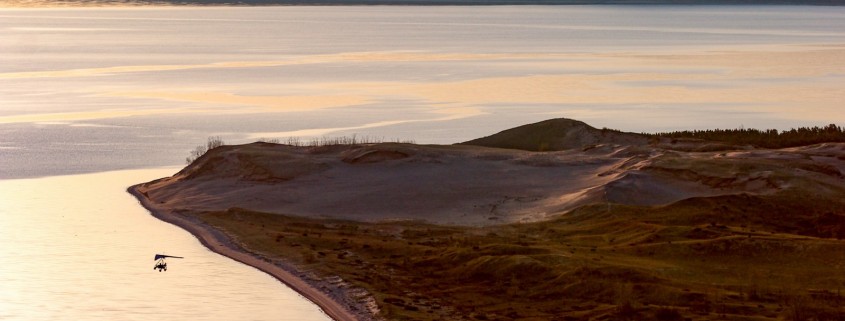



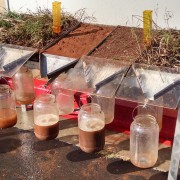
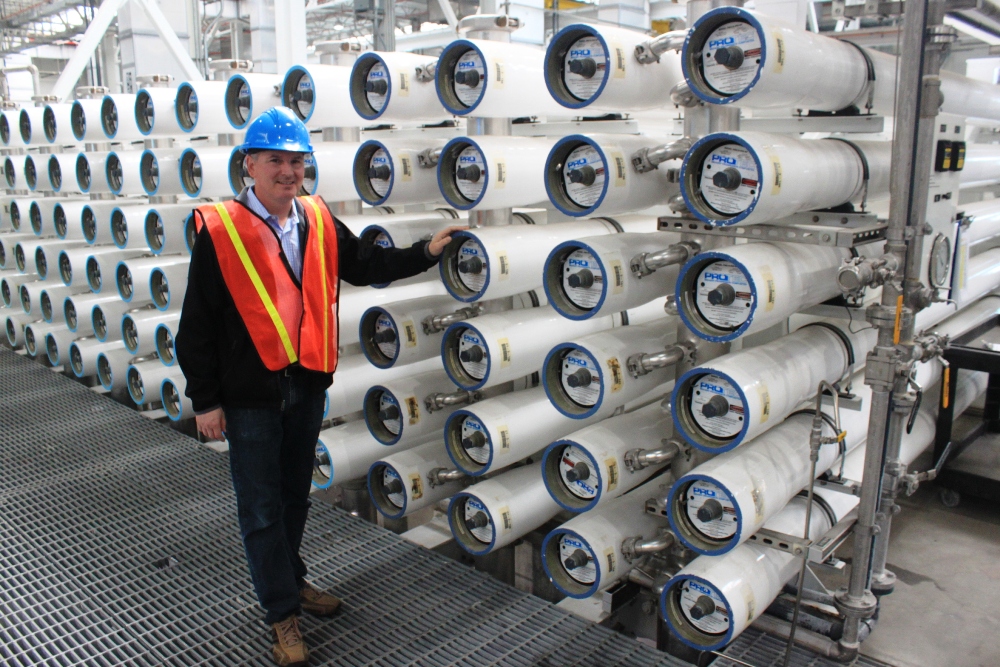
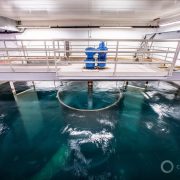
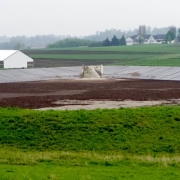



Leave a Reply
Want to join the discussion?Feel free to contribute!